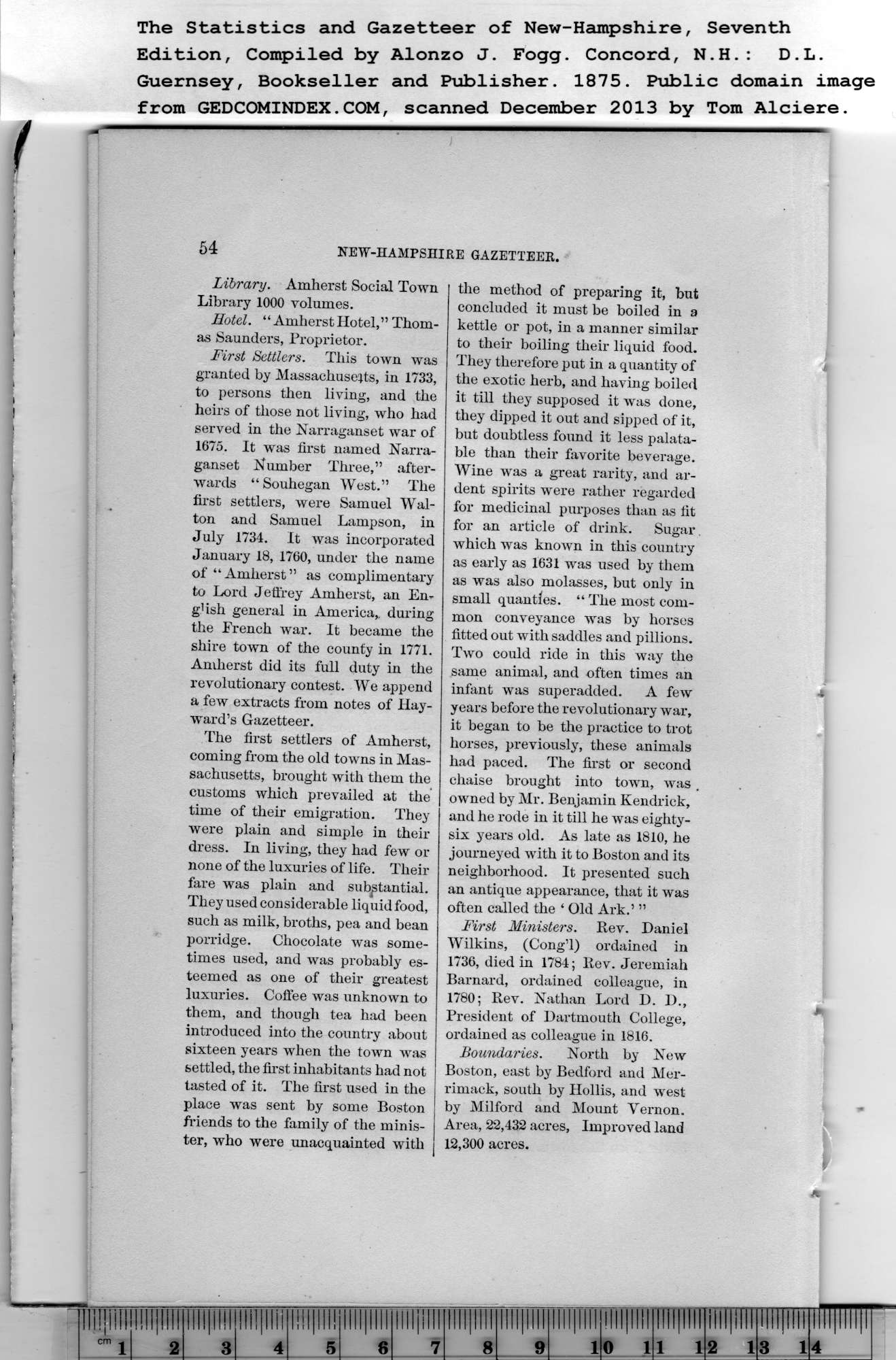|
Library. Amherst Social Town
Library 1000 volumes.
Hotel. “AmherstHotel,”Thom-
as Saunders, Proprietor.
First Settlers. This town was
granted by Massachusetts, in 1733,
to persons then living, and the
heirs of those not living, who had
served in the Narraganset war of
1675. It was first named Narra-
ganset Number Three,” after-
wards “Souhegan West.” The
first settlers, were Samuel Wal-
ton and Samuel Lampson, in
July 1734. It was incorporated
January 18, 1760, under the name
of “Amherst” as complimentary
to Lord Jeffrey Amherst, an Pn-
g’ ish general in America,, during
the French war. It became the
shire town of the county in 1771.
Amherst did its full duty in the
revolutionary contest. We append
a few extracts from notes of Hay-
ward’s Gazetteer. |
The first settlers of Amherst,
coming from the old towns in Mas-
sachusetts, brought with them the
customs which prevailed at the’
time of their emigration. They
were plain and simple in their
dress. In living, they had few or
none of the luxuries of life. Their
fare was plain and substantial.
They used considerable liquid food,
such as milk, broths, pea and bean
porridge. Chocolate was some-
times used, and was probably es-
teemed as one of their greatest
luxuries. Coffee was unknown to
them, and though tea had been
introduced into the country about
sixteen years when the town was
settled, the first inhabitants had not
tasted of it. The first used in the
place was sent by some Boston
friends to the family of the minis-
ter, who were unacquainted with
the method of preparing it, but
concluded it must be boiled in a
kettle or pot, in a manner similar
to their boiling their liquid food.
They therefore put in a quantity of
the exotic herb, and having boiled
it till they supposed it was done,
they dipped it out and sipped of it,
but doubtless found it less palata-
ble than their favorite beverage.
Wine was a great rarity, and ar-
dent spirits were rather regarded
for medicinal purposes than as fit
for an article of drink. Sugar
which was known in this country
as early as 1631 was used by them
as was also molasses, but only in
small qualities. “ The most com-
mon conveyance was by horses
fitted out with saddles and pillions.
Two could ride in this way the
same animal, and often times an
infant was superadded. A few
years before the revolutionary war,
it began to be the practice to trot
horses, previously, these animals
had paced. The first or second
chaise brought into town, was ,
owned by Mr. Benjamin Kendrick,
and he rode in it till he was eighty-
six years old. As late as 1810, he
journeyed with it to Boston and its
neighborhood. It presented such
an antique appearance, that it was
often called the ‘ Old Ark.’ ”
First Ministers. Rev. Daniel
Wilkins, (Cong’l) ordained in
1736, died in 1784; Rev. Jeremiah
Barnard, ordained colleague, in
1780; Rev. Nathan Lord D. 1).,
President of Dartmouth College,
ordained as colleague in 1816.
Boundaries. North by New
Boston, east by Bedford and Mer-
rimack, south by Hollis, and west
by Milford and Mount Vernon.
Area, 22,432 acres, Improved land
12,300 acres. |
